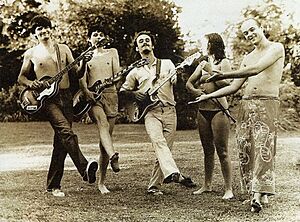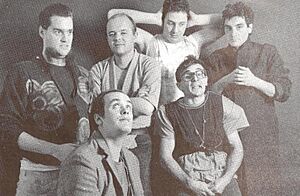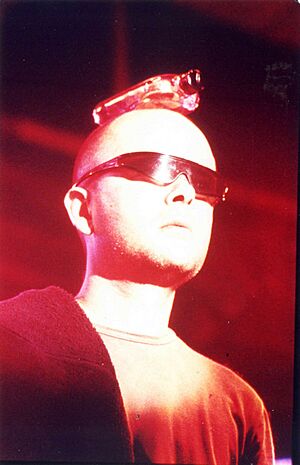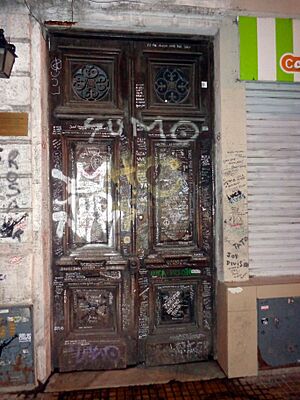Luca Prodan facts for kids
Quick facts for kids
Luca Prodan
|
|
|---|---|
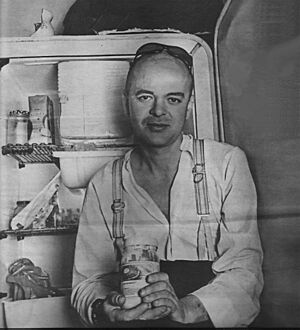
Prodan photographed for the cover of Clarín Newspaper in December 1987, a few days before his death
|
|
| Born |
Luca George Prodan
17 May 1953 Rome, Italy
|
| Died | 22 December 1987 (aged 34) Buenos Aires, Argentina
|
| Resting place | Avellaneda Cemetery |
| Nationality | Italian • Scottish |
| Education | The Gordonstoun School |
| Occupation | Musician • Singer • Songwriter |
| Years active | c.1970 – 1987 |
|
Notable work
|
Sumo |
| Relatives | Andrea Prodan (brother) |
Luca George Prodan (born May 17, 1953 – died December 22, 1987) was a talented musician and singer. He had both Italian and Scottish roots. Luca became very famous as the lead singer of the Argentine rock band Sumo. Many people think Sumo was one of the most important bands in Spanish-language rock history. Luca Prodan is still seen as one of Argentina's most influential artists.
Luca was born in Rome into a wealthy family involved in the art world. When he was nine, he went to school in the United Kingdom at Gordonstoun. There, he learned to play guitar and was greatly inspired by the new rock music of the 1970s. At seventeen, just before finishing school, Luca left and went back to Italy. He later returned to the United Kingdom for work, living in places like Brighton, Manchester, and London.
In 1980, Luca moved to Argentina. He met Germán Daffunchio and Alejandro Sokol, and together they formed the band Sumo. For the rest of the decade, until Luca's passing, Sumo became a very important band in Argentine rock. Luca and Sumo are known for bringing British post-punk music to Argentina and even to the rest of South America. They sang songs in English and offered a different, energetic style compared to other rock music at the time.
Luca Prodan was the older brother of Andrea Prodan, an Italian film actor and composer.
Contents
Early life and musical beginnings
Luca George Prodan was born in Rome on May 17, 1953. His father, Mario Prodan, was Italian, and his mother, Cecilia Pollock, was born in China to Scottish parents. His father had a successful business selling ancient Chinese ceramics.
Luca was the third of four children. His older sisters were Michela and Claudia, and his younger brother was Andrea. Both Michela and Andrea worked in movies. Andrea also had a musical background, singing in a famous English choir when he was young.
In 1962, when Luca was nine, his parents sent him to the famous Gordonstoun School in Britain. King Charles III also attended this school. There's a fun story in Argentina that Luca once hit King Charles III, even though the King is five years older! At Gordonstoun, Luca became good friends with Timmy McKern, a Scottish Argentine. They remained friends throughout Luca's life. In 1970, at age seventeen, Luca left Gordonstoun before graduating. His family asked Interpol to search for him, but Luca was traveling alone across Europe back to Rome. He was eventually found by his mother while being arrested by the police.
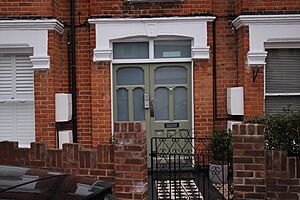
Later, Luca got a job at a new Virgin Records store in Marble Arch, London. He became known as "the Italian who could discover the title of a song and its interpreter just by listening to an out of tune whistle." This showed how much he knew about music!
While in London, Luca started his first band, The New Clear Heads. They had a similar style to punk bands like XTC, The Fall, Joy Division, and Wire. Luca loved British music, especially dub and reggae. He was also inspired by post-punk singers like Joe Jackson, Graham Parker, and Elvis Costello. The funny and lively style of Ian Dury & The Blockheads also influenced some of the fun songs Luca would later create with Sumo.
Career highlights
1980: Moving to Argentina
"It all started with a photo that crossed the ocean from these lands to Rome. Luca Prodan was walking on the verge of death and the family postcard he received showed Timmy McKern's Cordoban refuge where everything was life and nature. One dog, two girls, and a smiling couple with the mountains of Nono as the backdrop for an idyllic life. With Timmy, they had shared the school in the north of Scotland that Prince Charles of Wales also attended. Their invitation was the last card that Luca had to play and win a few more years of life. I didn't even imagine that, years later, with his music he would mark a break in the history of our rock."
Luca Prodan arrived in Argentina in March 1980. He knew very little about the country. He only had a picture Timmy McKern had sent him of his family in the mountains of Córdoba. Luca saw it as a peaceful paradise.
The day Luca arrived, Timmy McKern met him at the Ministro Pistarini International Airport of Ezezia. Luca stayed at Timmy's house in Hurlingham, Buenos Aires. There, Timmy introduced Luca to his brother-in-law, Germán Daffunchio, who was 20 years old. After dinner, Germán started playing his guitar. Luca joined in and began to sing. They immediately started thinking about forming a band. Soon, they moved to Timmy McKern's family farm in Valle de Traslasierra. Germán then introduced his friend, Alejandro Sokol. This is how Sumo was born, with Luca singing, Germán on guitar, and Alejandro on bass.
1981–1983: Sumo's early days
Timmy McKern, who would become the band's manager, saw how well Luca and Germán played together. He introduced Luca to Ricardo Curtet, a guitarist and friend. Luca then went back to London to buy instruments. He also convinced his friend Stephanie Nuttal to be the drummer for his new band. Stephanie had played in a rock band in Manchester.
The first members of Sumo were Germán Daffunchio on lead guitar, Ricardo Curtet on rhythm guitar, Alejandro Sokol on bass, Stephanie Nuttal on drums, and Luca Prodan on vocals. It was unusual to have a female drummer in rock bands at that time. In 1981, they recorded an album called Time, Fate, Love, which was released after Luca's passing.
The band decided to move to Hurlingham, where most members lived. This caused some changes, as Ricardo Curtet left the band to take care of his family. Once in Hurlingham, Sumo played their first concert at Caroline's Pub. They sang songs in English. After that, they played many shows at another local place called Mastropiero.
The Falklands War started in April 1982. Anything related to the United Kingdom, including the English language, became unpopular in Argentina. Stephanie Nuttal's parents asked her to return to England. So, Alejandro Sokol became the drummer, and Diego Arnedo joined as the bassist. Diego played in a band called MAM with brothers Omar and Ricardo Mollo. Ricardo Mollo would join Sumo later. Roberto Pettinato, a music journalist and radio host, joined Sumo in mid-1983. He brought a unique saxophone sound that helped define Sumo's music. Roberto was very impressed after seeing Sumo play live. He invited Luca to his radio show, and they became friends right away. Luca then asked Roberto to join the band.
1984–1985: Rising to fame
In 1984, Alejandro Sokol left the band. For a short time, Luca Prodan played electronic drums for some shows. Soon, Luca found Alberto Troglio, the drummer for the band Oiga Diga, and asked him to join Sumo. Later, Ricardo Mollo joined as a guitarist, invited by Diego Arnedo. This lineup – Luca, Germán Daffunchio, Diego Arnedo, Ricardo Mollo, Alberto Troglio, and Roberto Pettinato – stayed together until Luca's passing.
During these years, Luca Prodan often stayed at Mítico Café Einstein, a coffee shop in Buenos Aires, or at the owners' house. He played music almost every day. On weekends, he performed with Sumo. During the week, he worked on other projects like The Hurlingham Reggae Band, Ojos de Terciopelo, and Sumito (an acoustic group). These groups played many concerts every weekend at places like Mítico Café Einstein, Zero, Stud Free Pub, La Esquina del Sol, and Parakultural.
In 1983, Sumo released their first album, Corpiños en la Madrugada, as a cassette with limited copies. Two years later, in 1985, Sumo released their first "official" album, Divididos por la Felicidad. The title was inspired by the English band Joy Division. This album featured a lot of reggae influences, like Bob Marley's music, and also funk and post-punk. Their song La Rubia Tarada was the most successful from this album.
1986–1987: Final albums
In 1986, Sumo released Llegando los Monos. This album included different music styles like reggae, aggressive rock, and post-punk. Some of its songs became very popular, such as Exploding from the Ocean, El Ojo Blindado, and TV Caliente. The biggest hit from the album was Los Viejos Vinagres, which is probably Sumo's most famous song. After many successful concerts that year, Sumo became one of the most exciting bands of the time.
On May 23, 1987, Luca Prodan went to see another Argentine band, Patricio Rey y sus Redonditos de Ricota, play at the Cemento nightclub. Before the concert, Luca went to say hello to them backstage. The band invited him to join them on stage, and he agreed! Luca sang improvised lyrics in English during one of their well-known songs, Criminal Mambo, while the lead singer, Indio Solari, sang in Italian. In 1987, Sumo released their third and last album, After Chabón. This album showed how much their music and lyrics had grown.
Passing and legacy
On Tuesday, December 22, 1987, Luca Prodan passed away. He was found in the room he rented at 451 Alsina Street in San Telmo, Buenos Aires.
After his passing, two albums of his earlier recordings were released. These recordings were mostly made in the Traslasierra region and showed his musical inspirations, like Peter Hammill, David Bowie, Jim Morrison, Nick Drake, Lou Reed, Ian Dury, Ian Curtis of Joy Division, and Bob Marley. After Luca's death, two new bands were formed by former Sumo members: Divididos and Las Pelotas.
Tributes and recognitions
- The Argentine group Divididos, formed by his former bandmates Ricardo Mollo and Diego Arnedo, dedicated the song "Luca" to him on their album Gol de Mujer (1998).
- The singer Vicentico dedicated the song "Luca" to him from his album Sólo un Momento (2010).
- The Chilean funk group Los Tetas dedicated the song "Sale Luca" to him on their first album Mama Funk (1995).
- The Argentine group Bersuit Vergarabat mentions him in their song "En trance" from their album Don Leopardo (1996). They also pay tribute to him with the song "Murguita del sur" from their album Libertinaje (1998).
- Andrés Ciro Martínez dedicated the song "Malambo para Luca" to him on his first solo CD with his band, Los Persas (2010).
- Prodan is mentioned in the song "Todo eso" by Callejeros on the album Rocanroles sin Destino (2004).
- The Argentine heavy metal band Tren Loco dedicated the song "Luca no Murió" to him on the 2005 re-release of their album, ¡No me importa!
- In 1999, Luca, a documentary directed by Rodrigo Espina, was released.
- In 2002, the film Luca Vive was released, directed by Jorge Coscia.
- In 2008, the Danish documentary Together by Jannik Splidsboel, which showed a portrait of Andrea and Luca Prodan, premiered at the Berlin International Film Festival.
- A group of Argentinians, working with the Argentinian consulate, are trying to place a blue plaque on the house where Prodan lived in Chiswick.
Discography
Sumo
- Corpiños en la Madrugada (EP, 1983)
- Divididos por la Felicidad (1985)
- Llegando los Monos (1986)
- After Chabón (1987)
- Fiebre (1989)
Individual works
- Time Fate Love, recorded in 1980, released in 1996
- Perdedores Hermosos, recorded in 1981, released in 1997
See also
 In Spanish: Luca Prodan para niños
In Spanish: Luca Prodan para niños


